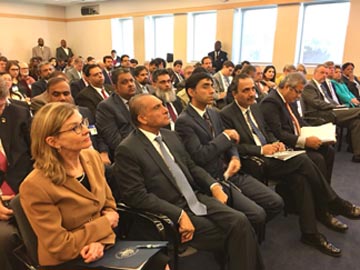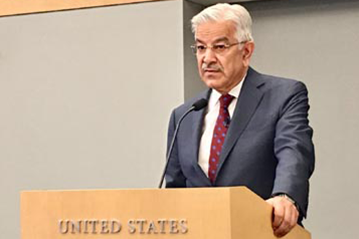President United States Institute of Peace Ms. Nancy Lindborg,
Distinguished Guests,
Ladies and Gentlemen:
Assalam-o-Alaikum,
It is a privilege to speak to this distinguished gathering of scholars, policy analysts and media representatives.
The USIP has demonstrated leadership in producingquality research & analysis on global trends that affect us all.
So, let me thank the USIP for this invitation to share my thoughts and to engage in a conversation on some ofkey issues of our interest.
Ladies and Gentlemen
As humans, we together confront chronic challenges of long wars, climate change, underdevelopment,global migration and rising intolerance in many societies.
Above all, the menace of global terrorism has claimed hundreds of thousands of lives, displaced millions and robbed the affected societies of their growth potential.
So history places an onerous burden on our shoulders to produce a better tomorrow from the disarray of our current times.
I am honored to represent a country that is actually overcoming challenges of disarray and wishes to build partnership for a secure and prosperous future.
In Pakistan, despondency has given way to optimism. Underdevelopment is being overcome by growth.
The last four years have transformed the landscape of Pakistan. Democratic institutions continue to thrive, terrorism is being vigorously combated, economy is being stabilized and is poised for rapid growth.
Yet, converting our domestic security and economic gains into wider regional stability remains a big challenge due to continued conflict in Afghanistan.
That is where Pakistan has been in sharp focus in Washington D.C in recent months. The burden of a 16 year long war in Afghanistan has been passed to the new Administration. For Pakistan, the timeline of managing fall out of Afghan instability is 38 years and counting. It is more than half of our life as an independent nation.
So our concerns are common. We also have similar aspirations in hoping to see stability in Afghanistan.
Most critically, Pakistan – a nation of 200 million people and a fast growing economy- believes that there is tremendous potential for a broad based and a standalone bilateral relationship.
You all know that in a public speech in August, President Trump announced new contours of the US policy for South Asia. While speaking on Pakistan, the President remarked that Pakistan had much to gain by working with the United States.
Let me briefly say that “We Agree”.
And please allow me to respectfully add that both United States and Pakistan have much to gain by working together.
A partnership that is anchored in mutual respect, pursuit of common interest and understanding of each other’s concerns has served us both.
I would like to use this opportunity afforded today to elaborate this further.
Ladies & Gentlemen
Pakistan considers itself a longstanding friend of the United States. Friends need to revitalize and refresh their friendship from time to time.
Our relationship is underpinned by certain shared values. Salient among these are respect for democracy, rule of law and protecting the freedom of our societies from dark ideological forces – whether these come in the garb of totalitarianism or take the form of violent extremism.
Today democratic institutions have helped create a vibrant and a politically active society in Pakistan that wishes to vigorously participate in public discourse on all issues of national importance.
Ladies and Gentlemen:
Since 9/11 our cooperation against terrorism has produced mutual gains and has helped degrade Al-Qaeda that attacked us both. With newer and more toxic forms of terrorism on the rise, the strategic logic for working together against terrorism remains intact.
However, lately there has been a tendency to place Pakistan’s counterterrorism credentials under focus.
The truth is that Pakistan is not just fighting but also winning against terrorism.
Four years ago, Pakistan had one the highest incidence of terrorism anywhere in the world. Pakistan responded to this tide of terrorism by building a strategic national consensus on a comprehensive counterterrorism strategy. This was as much a moral obligation as it was a national security imperative.
The national political consensus created the necessary space for a massive and a rapid counterinsurgency campaign that mobilized nearly 200,000 troops. It dealt a decisive blow to all terrorist networks that had taken advantage of the remote geography of the treacherous border with Afghanistan.
Our troops have bravely soldiered in terrain that has deceived visitors for centuries. What is often forgotten is that Pakistan has been conducting series of major counter-terrorism operations for over a decade and has progressively secured all territory on its side of the border.
Building on this success, Pakistan is taking a number of steps such as building border posts and fencing the border with Afghanistan to reduce cross border movement of militants.
Forceful law enforcement actions across the country and targeted military operations continue.
As a result of these successful operations Pakistan has seen the most significant decline in the number of terrorist attacks anywhere in the world. The civilian deaths due to terrorism have declined considerably since 2013.
Ladies and Gentlemen:
Pakistan’s successes in the fight against terrorism have come at a staggering human and financial cost.
With over 62,000 casualties, over $ 120 billion in economic costs in 16 years and with large scale deployment of security personnel for counter-terrorism, this has been Pakistan’s longest, the deadliest and the toughest fight.
From thousands of nameless Pakistanis to kids like the 17 years old Malala Yousufzai, the nobel laureate and 15 years old Aitzaz Hassan, the school boy who died while protecting his class fellows – to the 22 years old Lt ArsalanAlam who was martyred last month by terrorists attacking from Afghanistan – we have a long list of heroes in every town.
These sacrifices have helped create a secure environment for all Pakistanis including minorities.In April this year, our security forces thwarted a plan to bomb a Church on Easter aiming to kill hundreds of Pakistani Christians.
Ladies and Gentlemen:
By achieving better security in Pakistan, stability has returned and economic growth has soared.
Pakistan has registered rising growth rates for successive years. The economic growth rate was just 3% in 2013 and it increased to 5.3% in the 2016-17 fiscal year – the highest in a decade. The economy is forecasted to sustain high growth rates in coming years.
With improved forecasts by international credit rating agencies such as Moody’s and Standard & Poor, World’s leading Manufacturers and energy conglomerates are viewing Pakistan as an attractive destination. Tourism is expanding, Energy demand is rising and the retail market has been labeled as the fastest growing in the world.
Ladies and Gentlemen
One of the key pillars of our policy is to strengthen regional integration and economic connectivity. China Pakistan Economic Corridor is the most conspicuous element of this policy. The CPEC embraces a number of infrastructure and development projects.
Pakistan is also promoting other regional connectivity projects such as Central Asia South Asia (CASA) -1000 power project.
Clearly the dividends of achieving security and peace can be shared throughout the region.
And this is where both Pakistan and the United States can work together. We can together build on an improved security environment in Pakistan by expanding this arc of stability. This will strengthen regional economic connectivity, promote trade and bring prosperity to the whole region.
Ladies and Gentlemen
Achieving peace and security in Afghanistan would be critical for realizing this vision.
For nearly forty years, Pakistan has managed the blow back of political instability and violence in Afghanistan.
Most recently, large swathes of territory inside Afghanistan, which by independent estimates is around 40% of the country, has either fallen out of government control or is under contest. As a result, terrorists escaping Pakistan’s Counterterrorism operations, along with Da’esh, have found safe havens in these areas and continue to plan attacks against Pakistan. Only in one attack this year, they were responsible for killing atleast88 Pakistani pilgrims at a shrine in Sindh province.
Pakistan calls for effective elimination of these safe havens in Afghanistan.
Large ungoverned territories in Afghanistan under influence of non-state groups pose a security risk to the whole region and above all to Afghanistan itself.
Ladies and Gentlemen:
Sadly, peace has eluded Afghanistan for decades. Pakistan can understand the despondency that such a long conflict can produce. But pessimism is dangerous because it can take away hopes of peace through reconciliation and drive us to the beaten path of endless fighting. History reminds us that similar missions in Afghanistan did not end too well.
That is why Pakistan feels that the United States and Pakistan need to actively work towards peace. Pakistan’s support to an Afghan led and Afghan owned peace process remains strong. It is the responsibility of all parties to the conflict to take steps towards initiating a political process that can yield durable peace.
Pakistan seeks a productive relationship with Afghanistan. Eliminating safe havens inside Afghanistan, border management and return of Afghan refugees are critical pieces of our common challenges. There is also an urgent need to take effective counter narcotics measures in Afghanistan.
These issues cannot be allowed to linger on in a region with unresolved outstanding conflicts that already threaten peace.
Ladies and Gentlemen:
The plight of Kashmiris in Indian occupied Kashmir cannot be ignored by the international community. The Kashmiris have suffered all focus and manifestations of state sponsored terrorism.
As the time has passed the brutality of Indian security forces has increased and the civility of Indian occupation has diminished.
From blinding hundreds of innocent Kashmiris to enforced disappearances, extra judicial killings and torturing of illegal detainees, the occupying forces reached a new low this year when they tied Mr. Farooq Dar to a jeep and shamelessly paraded this human shield through the streets.
In the interest of peace, Pakistan can normalize relations with India. However, normalization requires that India stops its support to terrorism in Pakistan and agrees to hold unconditional dialogue on all matters of mutual concern including the core issue of Jammu and Kashmir.
Ladies and Gentlemen:
Before I conclude let me reiterate that since independence, our cooperation with the United States has served mutual interest. Pakistan appreciates American help in diverse areas of defence, education, agriculture and energy.
But let’s not forget that Pakistan has also helped the United States fight and degrade the organization that attacked the US on 9/11.
Within our limited capacity and without seeking quid pro quo, Pakistan has facilitated logistics of the United States’ longest war.
Pakistan expects a relationship based on mutual respect with recognition of each other’s sacrifices. Pakistan respects the sacrifice made by over 2000 US soldiers in Afghanistan. We do so because Pakistan has lost more soldiers in fighting terrorists than the US and all allied soldiers combined.
Pakistan will continue to work with the United States and the International Community for peace and stability in Afghanistan. This is a partnership that we not only desire; but cherish.
Beyond counter-terrorism, a nation of 200 million people and a growing economy presents many more avenues to build partnerships.
So let me emphasize that in pursuit of security, stability and prosperity, we both have much to gain by working together.
October 05 , 2017
Washington D.C



